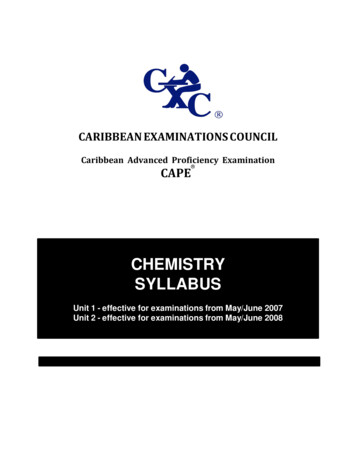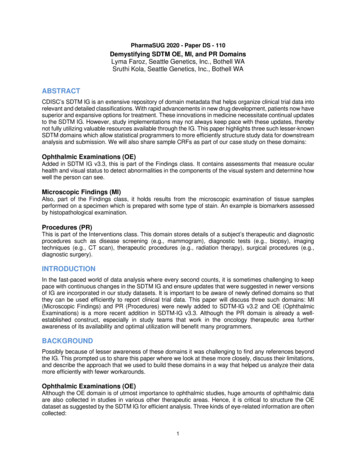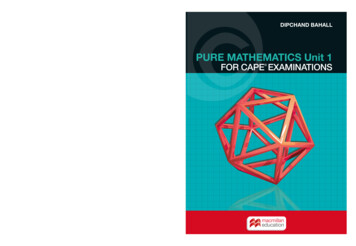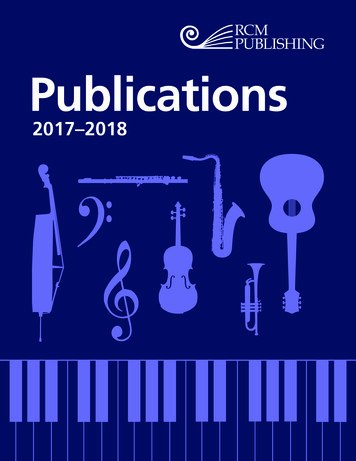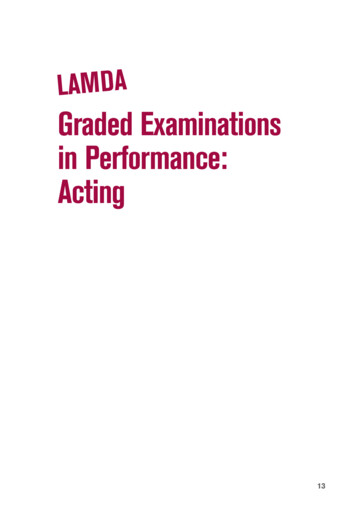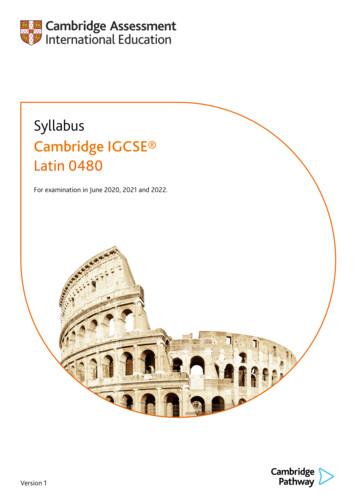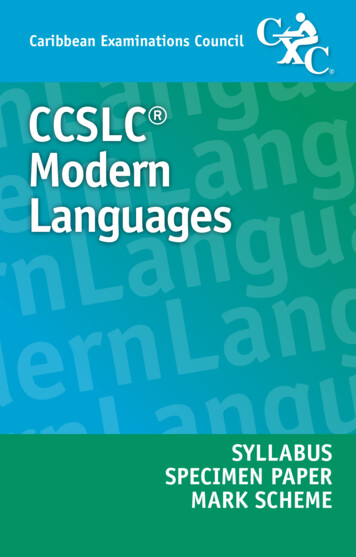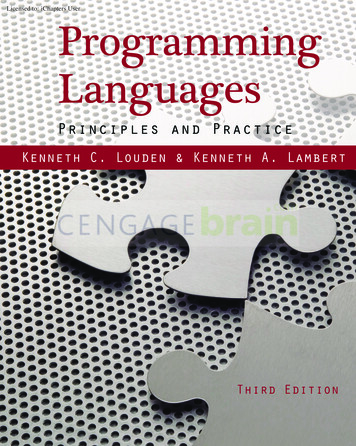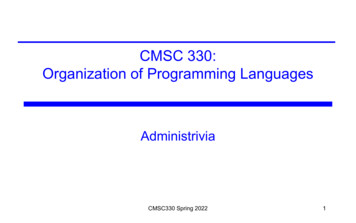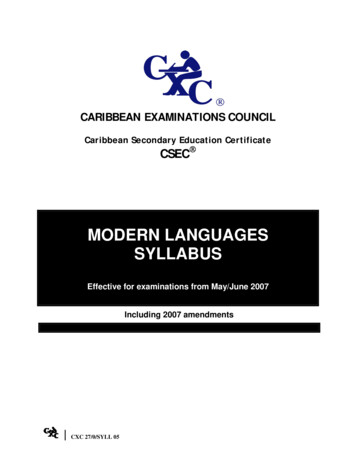
Transcription
CARIBBEAN EXAMINATIONS COUNCILCaribbean Secondary Education CertificateCSEC MODERN LANGUAGESSYLLABUSEffective for examinations from May/June 2007Including 2007 amendmentsCXC 27/0/SYLL 05
Published in Jamaica by the Caribbean Examinations Council, 2010 2010, Caribbean Examinations CouncilAll rights reserved. No part of this publication may be reproduced, stored in a retrieval system, ortransmitted in any form, or by any means electronic, photocopying, recording or otherwise without priorpermission of the author or publisher.Correspondence related to the syllabus should be addressed to:The Pro-RegistrarCaribbean Examinations CouncilCaenwood Centre37 Arnold Road, Kingston 5, Jamaica, W.I.Telephone: (876) 630-5200Facsimile Number: (876) 967-4972E-mail address: cxcwzo@cxc.orgWebsite: www.cxc.orgCopyright 2008, by Caribbean Examinations CouncilThe Garrison, St Michael BB14038, BarbadosCXC 27/0/SYLL 05
ContentsRATIONALE .1AIMS .1-2GENERAL OBJECTIVES OF THE SYLLABUS.2SPECIFIC OBJECTIVES OF THE SYLLABUS .3-4STRUCTURE OF THE EXAMINATIONS .4WEIGHTING OF THE SKILLS.4PROFILE DIMENSIONS .5SUGGESTED TIME-TABLE ALLOCATION .5CERTIFICATION5.FORMAT OF THE EXAMINATIONS .5-8CONTENT .9 - 31CXC 27/0/SYLL 053
The Modern Languages Syllabus (CXC 27/0/SYLL 96) was revised in 2005 for first examination in 2007.Teaching is expected to commence on the revised syllabus in September 2005.The amendments to the syllabusare indicated by italics.Please check the website, www.cxc.org for updates on CXC’s syllabuses.CXC 27/0/SYLL 054
Syllabus for Examinations inModern Languages RATIONALELanguage and communication are central to our everyday interactions. Global trends and technological advances havereduced distances, bringing nations and languages into our homes, connecting us with every part of the globe andincreasing opportunities for trade, travel and employment. This syllabus will contribute to the development of the IdealCaribbean Person as articulated by the CARICOM Heads of Government through the exploration of beliefs, values andbehaviors, students develop respect for human life, cultural heritage and the environment thus enabling them to view thetarget culture from a perspective of informed understanding.Language must be seen as integrally linked to culture. The study of French and Spanish provides an opportunity forCaribbean students to develop an understanding and appreciation of the cultural and historical contexts of Caribbeansocieties. Students will acquire certain skills, attitudes and knowledge that will contribute to their growing understandingof themselves and their environment. Students develop multiple literacies and independent and critical thinking in thecontext of foreign language learning and in keeping with the UNESCO Pillars of Learning.The Modern Languages syllabus focuses on developing students’ ability to communicate in two of the languages in use inthe Caribbean region. As students develop the competence to listen, speak, read and write in French and Spanish andinterpret aspects of the culture in which the languages are embedded, they acquire the means to facilitate deeperinteraction with our Caribbean neighbours. The topics selected for the syllabus reflect areas of interest to secondaryschool students. Language learning, therefore, provides an opportunity for students to compare their own experiences withthose of their peers in Francophone and Hispanic Caribbean countries.In designing the syllabus care has been taken to ensure that it reflects current trends in the teaching and assessment ofmodern languages at the secondary level. Ultimately, students will be equipped to meet the needs of living, studying andworking in a multilingual region and in a culturally and linguistically diverse world. AIMSThe syllabus aims to:1.encourage the acquisition of fundamental language skills needed to function successfully in practical everydaysituations requiring the use of the target language(s);2.develop an understanding of the standard spoken and written forms of French and Spanish;CXC 27/0/SYLL 051
3.encourage communication in French and Spanish in a manner acceptable to native speakers;4.encourage students to appreciate their own culture and those of their neighbouring Francophone and Hispaniccountries;5.develop a foundation for further study and the world of work. GENERAL OBJECTIVES OF THE SYLLABUSOn completion of the syllabus, students should:1.understand and respond appropriately to spoken French and Spanish from a variety of sources;2.communicate orally in French and Spanish in everyday situations;3.elicit and provide opinions and information;4.express ideas and emotions;5.read and understand material written in French and Spanish;6.communicate appropriately and accurately in writing in French and Spanish;7.develop insight into the cultures of the Francophone and Hispanic peoples of the region.The General Objectives may be grouped under the following headings:1.RECEPTIVEOn completion of the syllabus, students should:2.(i)understand the language as spoken clearly and simply;(ii)understand the language as written in selected or adapted texts.PRODUCTIVEOn completion of the syllabus, students should speak and write the language in a manner that is understood bythe native speaker.CXC 27/0/SYLL 052
SPECIFIC OBJECTIVES OF THE SYLLABUSStudents should be able to:1.respond appropriately to spoken forms of French and Spanish in everyday situations, for example, questions anddirections;2.identify the main points of a conversation and a continuous passage;3.use appropriate pronunciation and intonation when reading in French and Spanish;4.respond appropriately to simple written statements and instructions in French and Spanish in everydaysituations, for example, questions and directions;5.answer questions based on a continuous passage or dialogue, factual reports, written explanations, or othergraphic stimuli;6.respond appropriately to written material in French and Spanish using everyday situations;7.give explanations, directions and descriptions;8.request explanations, directions and descriptions;9.participate in conversations based on everyday topics;10.respond orally in everyday situations in a manner acceptable to native speakers;11.express ideas at a level of linguistic accuracy acceptable to a native speaker;12.write simple information and statements related to practical everyday situations;13.write simple information and statements relevant to students’ experiences;14.express ideas and opinions in continuous writing in French and Spanish, for example, in compositions, lettersand dialogues. STRUCTURE OF THE EXAMINATIONSThe Modern Languages Syllabus provides for examination at the General Proficiency level.CXC 27/0/SYLL 053
WEIGHTING OF THE SKILLSThe General Proficiency examination, places the emphasis on the production of the language and the ratioof Productive skills: Receptive skills is 58:42. PROFILE DIMENSIONSThe Receptive and Productive skills will be examined under four Profile Dimensions: Listening, Reading,Speaking, and Writing. These profiles will indicate the following types of performance:Listening-the ability to demonstrate comprehension of meaning conveyed throughoral/aural stimuli.Reading-the ability to demonstrate comprehension of meaning conveyed through pictorialor written stimuli.Speaking-production of spoken language in response to oral, aural or writtenstimuli.Writing-production of the written language in response to written and/or pictorial stimuli. SUGGESTED TIME-TABLE ALLOCATIONIt is recommended that a minimum of five 40-minute periods per week should be allocated to the coverageof the syllabus in the last two years of study. CERTIFICATIONFor the General Proficiency examination, in addition to the overall grades, a report will be given on thefour profile dimensions. FORMAT OF THE EXAMINATIONSGENERAL PROFICIENCYPaper 01(1 hour 20 minutes)A 60-item Multiple Choice test in two Sections at the GeneralProficiency level.PART A – Listening ComprehensionSections 1 – 4:CXC 27/0/SYLL 05(30 Items)Similar format to that of the Basic Proficiency examination. However,all of the questions in Section 4 will be different from those of BasicProficiency.4
PART B – Reading Comprehension (30 Items)Sections 1 – 4:Paper 02(2 hours 15 minutes)Similar format to that of the Basic Proficiency examination. However,all the questions will be different from those of Basic Proficiency.A written paper in four sections. All sections are compulsory.Section 1:Requires candidates to provide written responses in the target languageto a series of situations described in English.Section 2:Requires candidates to choose one of the following:Section 3:(i)an informal letter of about 130-150 words to be written in the targetlanguage; OR(ii)a composition of about 130-150 words to be written in the targetlanguage.Requires candidates to choose one of the following:(i)a contextual announcement of between 80-100 words which requirescandidates to complete information using cues in English; or(ii ) a contextual dialogue of between 80-100 words which requires candidatesto complete information using cues in English.Section 4:Requires candidates to answer questions in English based on a ReadingComprehension passage in the target language.Paper 03(10-15 minutes per candidate)An oral examination in the target language in three sections.Section 1:Requires candidates to respond orally to situations and/or instructions given inEnglish.Section 2:Requires candidates to read a passage aloud.Section 3:Requires candidates to participate by responding to 4 questions on each of fourtopics. These questions will be different from those of Basic Proficiency.CXC 27/0/SYLL 055
Weighting of Skills to be AssessedWeighting Table: General ProficiencyPaperSectionMark AllocationTotal MarksReceptivePaper 01Paper 02Paper 031Listen3021234123Marks% Per 0(42)80(33)240100(100)20251025205021CXC 27/0/SYLL 055021602568033
CONTENTThe syllabus content at pages 8 to 19 has been organised around three main concepts: Functions andNotions, Settings and Topics and Grammar and Lexis. These form the headings for three parallel columns,which should NOT be considered separately. In the Syllabus, emphasis is placed on the students’ ability touse the target language in a functional way. Therefore, the basic functions needed for communication areidentified. It is intended that these functions should be the core of the instructional planning process.Functions, however, are performed in particular contexts and, therefore, the settings in which the functionsare likely to be performed are identified. The last column provides some examples of the relevant grammarand vocabulary. However, these are not exhaustive as they are intended to be examples only.This approach used in organising the syllabus seeks to shift attention away from a purely structuralapproach to a more communicative one. It is expected that students following this syllabus will be able tocarry out these functions in the target language. A brief summary of the core topics and the tenses, whichstudents are expected to know, follows. These lists are intended to be a reminder of the basic knowledge tobe acquired by the student and should not be used in isolation from the rest of the syllabus.I.Oral ExaminationsCandidates should be able to carry out guided conversations based on the following topics:(a)(b)(c)(d)(e)(f)II.Home and FamilySchool and CareerSports and RecreationDaily RoutinesShoppingTravelUse of Tenses and MoodsCandidates should be able to use the following tenses and moods as they are relevant to eImperfectPerfectPluperfect*Past HistoricConditionalPresentPresent ContinuousFuturePreteriteImperfectPast ContinuousPresent PerfectPluperfectConditional*For recognition at General Proficiency only.CXC 27/0/SYLL 057
MoodsFrenchIndicativeImperativeInfinitiveThe Present Present Subjunctive*Imperfect Subjunctive**VoiceActive Voice, Passive Voice*For recognition at General Proficiency onlyESTABLISHING AND MAINTAINING SOCIAL RELATIONSHIPSFUNCTIONS/NOTIONSSETTINGS AND TOPICSGRAMMAR AND LEXISFRENCHSPANISHGreetings and responsesIn the classroom, in publicplaces, at home.Bonjour / Bonsoir.Salut, ça, va? Quoi deneuf? Très bien,merci. A vous aussi/Avous de même.Buenos días.¿Que tal?/ ¿Como teva?/¡Hola! ¿Qué pasa?¿Qué hay de nuevo?Muy BienIgualmente.FarewellsIn the classroom, in the home,in the street, in socialsituations, at the airport, at thetrain station.Au revoir, A bientôt/à tout à l’heure / àplus tard. Bonne nuit/ Bon voyage.!Hasta la vista!!Hasta luego!AdiosVaya con Dios!IntroductionsAmongst peers, younger toolder, female to male, lessdistinguished, to moredistinguished.Je te/vous présente.C’est .Voici.Le presento QuieropresentarEste es .Addressing personsOn formal and social occasions,in public places, in theclassroom, in the family,telephone conversations.Monsieur,Mon cher,Mon copain,Mon ami.Mon vieux,Señor,Compañero, Don,DoñaMi amigo.Chéri.Beginning and ending of lettersCXC 27/0/SYLL 05From the country of the target8Cher prénom.Estimado amigo,
FUNCTIONS/NOTIONSSETTINGS AND TOPICSlanguage to the home countryand vice versa, excuses,invitations.GRAMMAR AND LEXISFRENCHMon cher,Je vous embrasseAmitiés/ A bientôt/Bien des choses /Ecris-moi vite.Grosses bises.SPANISHQuerido,Un abrazo de tuamigo/Con cariñoBesos y abrazos/Cariños y saludosde.Holiday GreetingsAt Christmas, New Year,Easter.Joyeux Noël,Bonne AnnéeBonne fêteBonnes vacancesMeilleurs voeux,Joyeuses PâquesFeliz Navidad/Feliz Año Neuvo/Próspero añonuevo/FelicesPascuas.Birthday wishes and othergreetings for other festivedays/celebrationsAt home, in the street, at fêtesBon anniversaireBonne fête des Mères,Feliz cumpleañosFeliz día de Madres.ToastsDinners, Weddings, Flag-raisingceremonies, State visits.Vive .!Que .!A votre/ta santé!!Qué viva !!Salud!Thanking, expressing gratitudeLetter, social situations.MerciJe vous remercieJe vous (t') en prieJe vous suisreconnaissant(e)Etre obligéMerci bien/beaucoupll n'y a pas de quoi.De rienMuchas graciasMil graciasDe nadaNo hay de queApologisingAt home, at school, at workand other public places. Onthe telephone, in letters.Etre désolé de,S'excuser de,Pardon!Me disculpoSientoLo siento,¡Perdone!Expressing regret anddisappointmentAt home, at school, at work, inother social situations.Je suis déçu(e) deJe regrette que subj.Je te plains.Pardon! Tant pisQuel dommage!/HélasC'est dommage.Lo siento mucho¡Qué lástima!CongratulationsOn passing an examination; onwinning a prize/contest; on afine performance in sports,games, dances and otheractivities.Je vous félicite!¡Le felicito!¡Te felicito!CXC 27/0/SYLL ades!
FUNCTIONS/NOTIONSSETTINGS AND TOPICSGRAMMAR AND LEXISFRENCHSPANISHExpressing good wishesOn undertaking a venture.Bonne chance!Bon courage!Je vous/ te souhaiteBon séjour.¡Buena suerte!¡Que le vaya bien!¡Que te vaya bien!Expressing Sympathy andCondolencesOn the occasion of a death,illness and misfortune.Condoléances!Mes plus sincérescondoleances.(Toutes) mescondoléances.¡Mi más profundopésame!¡Te acompaño entus sentimientos!Calling attentionIn the home, in school, in thestreet and other public places.Attention!Tiens!Hé!Ecoute!Venez/Viens voir¡Cuidado!¡Mira!¡Dios mío!¡Qye!¡Ojo!Pardon, monsieurS'il vous plaît Au secours!Au voleur!¡Hola!Vouloir/aimer bien.Aimeriez-vous?Voulez-vous? VeuillezQuererQuisieraHágame el favorTenga la bondad deExpressing requestsAll settings and topics.Voudriez-vous?S'il te/vous plaitInviting2.All settings and topics.VouloirJe voudraisCela me plairaitS'il n'y a pasd'inconvénientPor favor.Querer,QuisieraInvitar aGustarsi no te conviene,si no tieneinconveniente.GIVING, SEEKING AND RESPONDING TO INFORMATIONFUNCTIONS/NOTIONSSETTINGS AND TOPICSGRAMMAR AND LEXISFRENCHIdentifyingIn the home, in school, instores and banks, inrestaurants/ hotels/airports/train stations/ports, inthe city, in the country.CXC 27/0/SYLL 0510EtreQu'est-ce que c'est?C'est, ce sont. Est-ceque c'est? Etes-vousmécanicien? A quiSPANISHSer¿ Qué es?Es/son.¿ Qué es esto?¿Es Vd. mecánico?
FUNCTIONS/NOTIONSSETTINGS AND TOPICSGRAMMAR AND LEXISFRENCHest le livre? ll estfrançais?SPANISH¿De quién es ellibro?¿El es venezolano?ll s'appelle .Ta maison, c'estlaquelle? Je suis lecadet/l'aîné.El se llama ¿Cuál es tu casa?Yo soy elmenor/mayor.Completing an applicationformOffices, embassies, educationalinstitutions, job locations.NomAdresseÂgeDate et lieu denaissanceNombreDirecciónEdadFecha y lugar denacimiento.DescribingDescription of persons, places,things.ll y aC'est lepremier/dixièmeUne voiture bleueUn vieil hommeUne femme mariéeHayPrimero a décimoUn buen muchachoUn hombre ricoUna mujer casadaDescribing how things are doneAll settings and topics.BienViteBienRápidoLentementAvec soinSans hésiterll est sorti en courant*Fini le repas .LentamenteCon cuidadoSin vacilarSalió corriendoTerminada lacomida.ll pleutll fait beauau clair de luneLlueveHace buen tiempoHay lunall est midill est deux heuresTôtTardCe moisCette annéeCe matinAujourd'huiHier, cette nuitLa semaine prochaineLa semaine dernièreL'année prochaineL'année dernièrell y a deux ansll attend depuis deuxEs mediodíaSon las dosTempranoTardeEste mesEste añoEsta mañanaHoyAyerAnocheHace dós días queesperaHace dos días queesperabaMe voy el lunesDescribing weather, time,seasonCXC 27/0/SYLL 05Temperate and tropical places.11
FUNCTIONS/NOTIONSSETTINGS AND TOPICSGRAMMAR AND LEXISFRENCHjoursll attendait depuisdeux joursNous rentrons tôt lelundiJe pars lundiOn se verra dansdeux joursSPANISHVoy a la iglesia losdomingosAu printemps, à toutà l‘heureEn été.La saison sèche /lecarêmeLa saison despluies/l'hivernageUn cycloneUn ouragan*For General Proficiency onlyEn el veranoEl veranoEl inviernoEl ciclónEl huracánLa estaciónlluviosa/secaNarratingImaginative and personalincidents.L'argent a été voléOn a volé l'argentLa porte s'ouvrell allait tomberElle venait de mangerquand ll a décidé de fairell voulait faireEl dinero fuerobadoSe robó el dineroRobaron el dineroEl iba a caerAcababa de comercuando Decidió hacerQuería ir a casaQuantifying and listingIn shops, hotels, markets,supermarkets, in the home, inschools and other public places.Je voudrais de laviande/du beurre/desorangesJe ne veux pas de laitEn voilà uneDe la monnaie?.jen'en ai pasUn un millionJe fais chimie,boilogie, françaisespagnol Deux kilos de Un litre deUne bouteille deCombien de?Beaucoup deBien desTrop deAssez deAucunQuisiera carneCXC 27/0/SYLL 0512Uno.a un millónEstudio la quîmica,la biologîa, elespañolDos kilos de Un litro de Una botella de ¿Cuántos?MuchoDemasiadoBastanteNinguno
FUNCTIONS/NOTIONSSETTINGS AND TOPICSGRAMMAR AND LEXISFRENCHLocatingAll settings and topics.Au/à laSurDansContre, à côté deAu fond de/autourdeL'AfriqueL'EuropeLe CanadaLe SénégalLa FranceLa MartiniqueLes Etats-unisLa HavaneLe HavreSobre, en, al lado deAlrededor deLa ArgentinaEl PerúEl CanadáLos Estados UnidosLa HabanaChez moi, vers, enhaut, tout droit, làbas, à gauche, àdroite, au nord/nord-Hacia arribaHacia abajoTodo derechoA la derechaouest, au sud/ au sudest, À l'ouest, dans lenord deQuestioning and Inquiring3.All settings and nt?Que?N'est-ce pas?A la izquierdaAl norte/noresteAl sur/sudeste¿Qué?¿Cuál?¿Dónde?¿Por qué?¿Cómo?¿Quién?¿No sé si Mepregunto?¿verdad?EXPRESSING OPINIONSFUNCTIONS/NOTIONSSETTINGS AND TOPICSGRAMMAR AND LEXISFRENCHExpressing agreement anddisagreementCXC 27/0/SYLL 05All settings and topics13SPANISHne.pasne.que, seulementNo.No más de/que,solamenteNi non plusNe without pasPas without neNi tampocoEquivocarseTener razón
FUNCTIONS/NOTIONSSETTINGS AND TOPICSGRAMMAR AND LEXISFRENCHAvoir raison/tortOui, si, mais si.Non, mais non.Pas question.Entendu, bien sûr.être d'accordEtre d'accord avecqqnEtre d'accord pourCroire, penser, voirEntendreExpressing confirmation anddenialAll settings and topicsll est évident quell n'y a pas de douteque.ll ne fait aucun douteJ'estime que.Je sais queSPANISHSí, no.¡De ningunamanera!¡Nunca!¡Bueno!Estar de acuerdoconCreer, ver parecerEs claro queNo hay duda queCreo que Sé que Negar.Je pense queNierC est fauxExpressing possibility, doubts,disbelief, conjecture, certainty,uncertaintyAll settings and topicsExpressing opinions4.PouvoirPeut-être ImpersonalexpressionsEtre sûr/certainMais bien sûr!Certainement!Sans doute!Absolument!PoderTal vez, quizás acasoImpersonalexpressionsEstar seguro¡Seguramente! Sinduda!¡Por supuesto!Je pense queJe crois queJe diraisÇa se ditA son avis, selon/d'après.Creo, pienso, mepareceA mi parecerEn mi opinionEXPRESSING EMOTIONS, ATTITUDES AND OTHER RESPONSESFUNCTIONS/NOTIONSExpressing approval, happiness,liking, satisfaction, disapproval,dislike, dissatisfactionCXC 27/0/SYLL 05SETTINGS AND TOPICSAll settings and topics14GRAMMAR AND LEXISFRENCHSPANISHVouloir, désirer aimerêtre bien, êtrecontent deapprouver, plaire à,satisfaireGustar, estar bienestar contento con,deSatisfacerNo tener
FUNCTIONS/NOTIONSSETTINGS AND TOPICSGRAMMAR AND LEXISFRENCHAllez!ChouetteZut alors! C'est bonC'est bienne pas aimerdétesterÊtre contre/désapprouverSPANISHinconveniente¡Dale!/ ¡Qué asco!Expressing preferenceAll settings and topicsPréférer/aimer mieuxPreferir, gustar más,más que, menosque.Expressing interest, lack ofinterestAll settings and onalexpressionsPlaire àêtre intéressé parTener interés enInteresarse enQuisieraS'intéressér àAvoir envie deExpressing surpriseAll settings and topicsS'étonner deEtre surprisêtre étonnéSurprendreÇa m'étonne que subjunctiveÇa ne m éC'est étonnant/surprenantQuelle surpriseÇa alors!Estar sorprendido¡Qué sorpresa!¡ Qué alegría!Expressing hopeAll settings and topicsPenser, espérer,compter, vouloirN'est-ce pas?Esperar, pensarQue subjunctiveExpressing worry, fearAll settings and topicsThe expletive NeAvoir peur, craindrede infinitive,craindre que subjunctiveS'inquiéter, sesoucier.Oh là là!Temer, tener miedoInsistingAll settings and topicsInsister sur/pour queInsistir en,CXC 27/0/SYLL 0515
FUNCTIONS/NOTIONSSETTINGS AND TOPICSGRAMMAR AND LEXISFRENCH subjunctiveAvoir l'intention deRépéterDevoirSavoirRappelerll faut infinitivell faut que subj.ll est nécessaire que subj.Expressing want, wish, desireAll settings and topicsSPANISHPensar infinitiveRepetirDeberSaberHay que infinitiveHace faltaNecesitaDésirerChercherAvoir besoin deAimerDesearBuscarQuererTener ganas deVouloirTenir àll me fautAvoir la bonté deNecesitarExpressing willingnessAll settings and topicsVouloir bienVoulez-vous ?VolontiersAvec plaisir.QuererTener la bondad deCon gustoGranting/seeking permissionAll settings and topicsPermettre à . deDire à deDonner la permissionà deD'accordPermitirDejarDar permiso aLaisserDemander lapermissionFaire une demandePouvoirPermettez-moiJe me permets deS'il vous plaîtRogarPedirPoderPermítameMe permite infinitiveExpressing obligationAll settings and topicsDevoir/ ll fautll faut que subj:ll est nécessaire que subj:Etre obligé deDeberHay queNecesita queTener queExpressing prohibitionAll settings and topicsDéfendre à deInterdire à . deArrêter deImpedirDejar deEvitarCXC 27/0/SYLL 0516
FUNCTIONS/NOTIONSExpressing commands,instructions, directionsSuggesting a course of actionSETTINGS AND TOPICSAll settings and topicsAll settings and topicsGRAMMAR AND LEXISFRENCHEmpêcher deNe pas permettrell est interdit dell ne faut pasSPANISHProhibirseInfinitivesNegative infinitivesVoulez-vousInfinitivesNegative infinitivesTener la bondadQuestion forms:positive andnegativeImperativesS'il vous/te plaîtQuestion forms:negative andpositiveImperatives1st person pluralimperativeQuestion formsSuggérer/proposer de1st person pluralimperativeQuestion formsSugerir/proponerDire deInviter à*Si the imperfecttenseAller infinitive¿Qué te parece si ?Ir a infinitive¿Por qué no?Valoir la peineOn y va?Pourquoi pas?AdvisingAll settings and topicsPositive and negativell vaudrait mieux que subj.ConseillerDonner des conseilsll vaut mieuxÇa vaut la peineWarningAll settings and topicsCXC 27/0/SYLL 0517Positive andnegativeAconsejarDar consejoMás valeVale la penaConditional or IfclausesPrévenir, avertir,alerterConditional or IfclausesAvisar, ado!¡Ojo!¡Peligro!
FUNCTIONS/NOTIONSSETTINGS AND TOPICSGRAMMAR AND LEXISFRENCHSPANISHPromisingAll settings and topicsAller infinitivePromettre.OffrirDonner la paroleIr a infinitivePrometerOfrecer/ofrecerseDar la palabraThreateningAll settings and topicsAller infinitiveMenacerConditional clausesIr a infinitiveAmenazarAttention!Si tu continues à inf futureConditionalclausesPuis, ensuite, alors,finalement, enfin,d'abord, en premierlieuPues, luego,entonces, después,por lo tanto, asíque.5.CONNECTIVESTime SequenceAll settings and topics*For General Proficiency onlyAdditionAll settings and topicsEt puis, ensuite, deplusy, e, de ahí,también, ademásReinforcingAll settings and topicsEn plus, de plus, enoutre, et encore,d'ailleursAdemás, es más,aun más, sobre todoSimilarityAll settings and topicsAussi bien que,comme, égalementAsí como, tantocomoIntroductionAll settings and topicsll y avait une foisll était une foisUne foisPar un jourHabía una vezUna vezSummarisingAll settings and topicsBref, en tout, en gros,en sommeCela va sans dire/ ilva de soiFinalementEn breve, enresumen, al fin y alcaboA fin de cuentasResult, consequenceAll settings and topicsDe sorte que ( subj.)De manera quell résulte quePar conséquent, doncClauses ofconsequenceCXC 27/0/SYLL 0518De resultado.Por consecuencia/por consiguiente/aconsecuencia de.Clauses of
FUNCTIONS/NOTIONSSETTINGS AND TOPICSGRAMMAR AND LEXISFRENCHSPANISHconsequenceDeduction, inductionAll settings and topics.Donc, ainsi, et ainside suiteAsí, pues, por lotanto, por eso.ConclusionAll settings and topics.Pour conclure,finalement, en fin decompte, enconclusionEn conclusión, porfin, finalmenteExplicationAll settings and topics.C'est-à-dire,autrement dit,Exprimer autrementVouloir direSignifierEs decir, o sea, enotras palabras.Querer decirExemplification/illustrationAll settings and topics.Par exemple.Et caeteraSelon/d'aprèsCiterPor ejemplo.etcéteraSegúnCitarDonner des exemplesDar ejemplosContrast and co-ordinationAll settings and topicsAu contraire, quandmême, mais, d'uncôté de l'autre côté,de plus, donc, ou, oubienetne ni niAl contrario, pero,sino, por otra parteY, eNo ni niReplacementAll settings and topicsSinon, au lieu de, à laplace de, en échangePourtant, cependant,néanmoins.*Quoique/bien que subj.En lugar de, en vezde*Clauses ofconcession*For General Proficiency onlyCXC 27/0/SYLL 0519Sin embargo; noobstante, aúnAunque*Clauses ofconcession
LIST OF CARIBBEAN WORDSSPANISHA. NATURE1.General Vocabularyel inviernola inviernala sequíael veranoel barranco/la barrancael cerro2.-winterrainy seasondroughtdry seasongullyhillFaunael agutila cabra/el chivoel caiman/el lagartoel camarónel cangrejola conchael cotorro/el lorola jagüilla/el quequeola langostala lagartijael tiburónla tortugael ild boarlobstersmall lizardsharkturtlehumming bird3.Flora (including fruit and vegetable)el aguacateavocadola anonacustard appleel ayote/la calabazapumpkinel bambúbamboola berenjenaeggplantla caña de azúcarsugar caneel caimitostar appleel camotesweet potatoel chayote/el güisquilcho chola ciruela Americanagolden plumel frijolbeanla guayabaguavael guineobananael limónlimeel maízcornla malangaeddoel mangomangoel mazapánbreadfruitla naranjaorangeel ñameyamel ócorrookrala papayapawpawla piñapineappleel plátanoplantainel tamarindotamarindla toronjagrapefruitel tulipánhibiscusel cocoterococonut treeel bananobanana treeel mangoteromango treeel aguacateropear treeel palmeropalm treeB. COUNTRY AND INHABITANTS1.Country2.AnguillaAntigua y Barbuda-BarbadosBeliceCubaEl CaribeDominicaLa GuyanaInhabitantsel de Anguillaél de Antigua y Barbuda-AnguillanAntiguan and Barbudian-AnguillaAntigua andBarbudaBarbadosBelizeCubaThe oguyanés-DominicaGuyaneseCXC 27/0/SYLL 0520
Country (cont’d)Inhabitants (cont’d)La Guyana FrancesaGrenadaGuadalupe-French as AntillasMartinica-The West IndiesMartiniqueMontserratLa República Dominica-San Cristóbal-Santa LucíaSan topher/
3. encourage communication in French and Spanish in a manner acceptable to native speakers; 4. encourage students to appreciate their own culture and those of their neighbouring Francophone and Hispanic countries; 5. develop a foundation for further study and the world of work. GENERAL OBJECTIVES OF THE SYLLABUS . On completion of the syllabus, students should:

